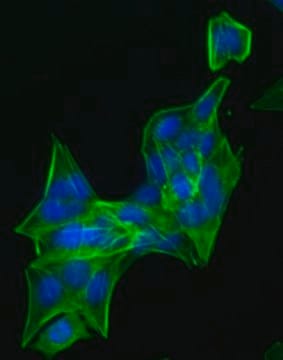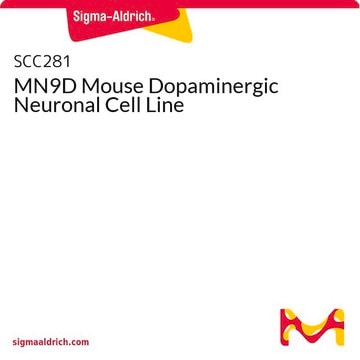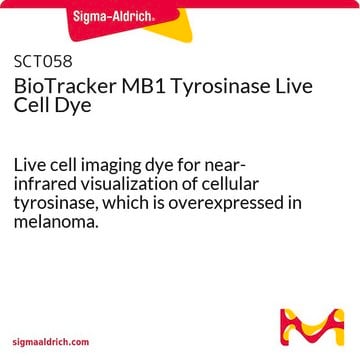SCC421
VCaP-EnzR Human Enzalutamide Resistant Prostate Cell Line
Human
Sinónimos:
Enzalutamide-resistant prostate cancer cells
Iniciar sesiónpara Ver la Fijación de precios por contrato y de la organización
About This Item
UNSPSC Code:
41106514
NACRES:
NA.81
Productos recomendados
product name
VCaP-EnzR Human Enzalutamide Resistant Prostate Cell Line,
biological source
human
packaging
vial of >1X10⁶ cells
manufacturer/tradename
Millipore
growth mode
N/A
technique(s)
cell culture | mammalian: suitable
shipped in
dry ice
storage temp.
≤ − 140°C
Application
Prostate cancer (PCA) is the most frequently diagnosed cancer among men in the USA, with over 150 000 new cases expected annually. Approximately 6% become metastatic, with a 5-yr survival rate of only 29%. Metastatic lesions form most frequently in bone. Since the 1940s, the standard treatment for advanced PCA has been surgical or chemical castration targeting the androgen receptor (AR) signaling axis. Most treated patients, however, develop resistance and become androgen independent, which contributes to disease progression and poor prognosis, delineating a critical need to identify novel targetable pathways mediating resistance (1). The scientific investigation of PCA tumorigenesis and experimental therapies has been limited to a few of cell- and animal-based model systems.
Source:
Xenografted into SCID mice before propagated in cell culture, the parental PCA cell line VCaP derives from a vertebral metastatic lesion of a hormone refractory prostate cancer patient. Successfully cultured for over 50 passages in vitro, VCaP is considered an immortalized cell line (2). VCaP-EnzR is an enzalutamide resistant (EnzR) derivative of VCaP, developed by prolonged in vitro culture with enzalutamide, a second-generation AR antagonist efficacious in the treatment of castration resistant prostate cancer. VcaP-EnzR is a valuable research tool for studying castration resistant prostate cancer (3).
Biosafety Level 2
VCaP-EnzR cells contain mouse xenotropic retrovirus Bxv-1 and should be handled under biosafety level 2. The parental VCaP prostate cancer cell line is known to produce the mouse xenotropic rerovirus Bxv-1, which was likely acquired by the cells during their xenotransplantation in mice.
References:
1. Kelly SP et al. (2018) Past, current and future incidence rates and burden of metastatic prostate cancer in the United States. Eur Urol Focus 4(1):121–127.
2. Korenchuk S et al. (2001) VcaP, a cell-based model system of human prostate cancer. In Vivo 15(2):163-168.
3. Kregel S et al. (2016) Acquired resistance to the second-generation androgen receptor antagonist enzalutamide in castration-resistant prostate cancer. Oncotarget 7(18):26259-26274.
Source:
Xenografted into SCID mice before propagated in cell culture, the parental PCA cell line VCaP derives from a vertebral metastatic lesion of a hormone refractory prostate cancer patient. Successfully cultured for over 50 passages in vitro, VCaP is considered an immortalized cell line (2). VCaP-EnzR is an enzalutamide resistant (EnzR) derivative of VCaP, developed by prolonged in vitro culture with enzalutamide, a second-generation AR antagonist efficacious in the treatment of castration resistant prostate cancer. VcaP-EnzR is a valuable research tool for studying castration resistant prostate cancer (3).
Biosafety Level 2
VCaP-EnzR cells contain mouse xenotropic retrovirus Bxv-1 and should be handled under biosafety level 2. The parental VCaP prostate cancer cell line is known to produce the mouse xenotropic rerovirus Bxv-1, which was likely acquired by the cells during their xenotransplantation in mice.
References:
1. Kelly SP et al. (2018) Past, current and future incidence rates and burden of metastatic prostate cancer in the United States. Eur Urol Focus 4(1):121–127.
2. Korenchuk S et al. (2001) VcaP, a cell-based model system of human prostate cancer. In Vivo 15(2):163-168.
3. Kregel S et al. (2016) Acquired resistance to the second-generation androgen receptor antagonist enzalutamide in castration-resistant prostate cancer. Oncotarget 7(18):26259-26274.
Features and Benefits
VCaP-EnzR Human Enzalutamide Resistant Prostate Cell Line is a valuable research model for studying castration resistant prostate cancer
Storage and Stability
Store in liquid nitrogen. The cells can be cultured for at least 10 passages after initial thawing without significantly affecting the cell marker expression and functionality.
Other Notes
This product is intended for sale and sold solely to academic institutions for internal academic research use per the terms of the “Academic Use Agreement” as detailed in the product documentation.
Disclaimer
RESEARCH USE ONLY. This product is regulated in France when intended to be used for scientific purposes, including for import and export activities (Article L 1211-1 paragraph 2 of the Public Health Code). The purchaser (i.e. enduser) is required to obtain an import authorization from the France Ministry of Research referred in the Article L1245-5-1 II. of Public Health Code. By ordering this product, you are confirming that you have obtained the proper import authorization.
Unless otherwise stated in our catalog or other company documentation accompanying the product(s), our products are intended for research use only and are not to be used for any other purpose, which includes but is not limited to, unauthorized commercial uses, in vitro diagnostic uses, ex vivo or in vivo therapeutic uses or any type of consumption or application to humans or animals.
Storage Class
10 - Combustible liquids
wgk_germany
WGK 2
flash_point_f
Not applicable
flash_point_c
Not applicable
Certificados de análisis (COA)
Busque Certificados de análisis (COA) introduciendo el número de lote del producto. Los números de lote se encuentran en la etiqueta del producto después de las palabras «Lot» o «Batch»
¿Ya tiene este producto?
Encuentre la documentación para los productos que ha comprado recientemente en la Biblioteca de documentos.
Nuestro equipo de científicos tiene experiencia en todas las áreas de investigación: Ciencias de la vida, Ciencia de los materiales, Síntesis química, Cromatografía, Analítica y muchas otras.
Póngase en contacto con el Servicio técnico






